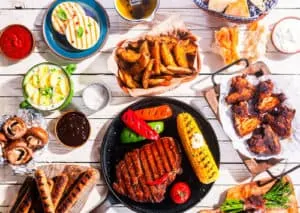Archives

Best Summertime Snacks for Teeth
- Veggies
Yummy raw, crunchy vegetables aren’t only great for your body, they’re fantastic for your teeth, too. Snacks like broccoli, carrots, celery, and peppers gently scrub away plaque buildup and give your teeth a little bit of a cleaning. This helps protect your smile against decay and can even help freshen breath.
- Fruits
Veggies sweeter cousin fruits are also a great snack option. Not only are many fruits fresh and in season this time of the year, but they can also help clean your teeth and rub away plaque. Kiwis, for example, have calcium which is always great for your bones and, of course, your teeth. Another fan favorite is raw apples.
- Cheese
Another tasty snack that can help remove plaque is cheese. But this yummy food is also loaded with calcium and vitamin D. The duo of calcium and vitamin D is a powerhouse that works together to build super strong bones and teeth. Cheese can also increase saliva production, which will help rinse away bacteria and sugar.
Summer Snacks That Can Harm Teeth
- Condiments
Dressings, sauces, and dips can seem harmless enough but the truth is these condiments are a sneaky danger. BBQ sauce and ketchup, for example, contain a lot of sugar and are acidic — both of which are bad for teeth.
- Soda
It’s well-known that your dentist in Sparks isn’t a huge fan of soda, and with good reason. Soda is packed with tons of sugar which essentially coats your teeth when you drink it. Sugar is one of your smile’s natural enemies as it can feed bacteria, wear away enamel, and increase the risk of decay.
- Alcohol
Drinking alcohol can greatly increase the risk of gum disease and decay. Certain types of alcohol can also lead to tooth discoloration. Lastly, alcohol can cause dry mouth, further putting teeth in danger of decay.
At our dental office in Sparks, we’re not here to tell you to avoid these summer treats, we simply recommend enjoying them in moderation. Additionally, it’s always wise to drink plenty of water after eating or drinking alcohol to help wash away sugar or food particles.

The Most Common Dental Emergencies
The best thing you can do in the event of a dental emergency is to schedule an appointment with your dentist in Sparks as soon as possible. But there are some ways you can relieve discomfort and increase the chances of an easier treatment in the meantime.
- Knocked Out Tooth – Getting a tooth knocked out can certainly be scary. Acting quickly and calmly can actually help save your tooth, but there are some things you should know. After you find the tooth, only touch the crown and avoid contact with the roots. If you can, put the tooth back into the socket gently. If you can’t, place the tooth in a cup of milk or store it under the tongue with some spit and get to a dentist.
- Lost Filling – There are a number of things that can cause a filling to fall out, leaving a hole in your tooth. This can be painful as your tooth roots may now be exposed. The best thing to do is to fill the hole to protect those roots. Many pharmacies and grocery stores have dental cement you can buy and use to fill the hole. While this may help reduce pain, it is a temporary solution, and you should still see your dentist as soon as you can.
- Chipped or Broken Tooth – An injury or even something hard and crunchy can chip or break a tooth. Don’t panic. First, find any pieces of the tooth and rinse them off with water. If you’re bleeding, apply a piece of gauze and press. A cold compress can help with the pain and any swelling that may occur. There are many ways a tooth can be fixed, so again, schedule an appointment with your dentist.
Avoid a Problem
Even though nobody can really anticipate a dental emergency, you can help reduce your risk of one by making sure you see your dentist in Sparks every six months for regular checkups. These visits can help identify any potential problems before they become a painful surprise. You can also watch what you eat and make sure you wear a mouthguard when playing sports to further protect your smile.
The team at our Sparks dental office is here to help our patients and community stay healthy. Schedule an appointment with us today!
